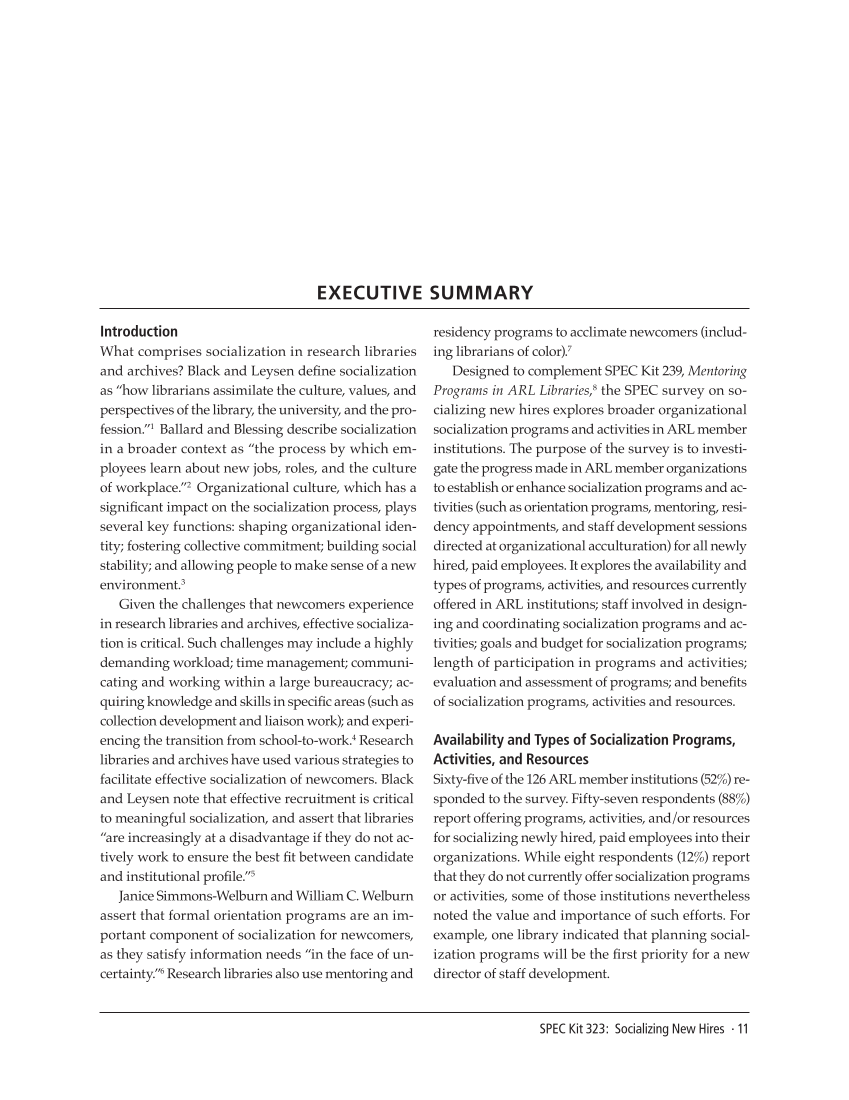SPEC Kit 323: Socializing New Hires · 11
Executive Summary
Introduction
What comprises socialization in research libraries
and archives? Black and Leysen define socialization
as “how librarians assimilate the culture, values, and
perspectives of the library, the university, and the pro-
fession.”1 Ballard and Blessing describe socialization
in a broader context as “the process by which em-
ployees learn about new jobs, roles, and the culture
of workplace.”2 Organizational culture, which has a
significant impact on the socialization process, plays
several key functions: shaping organizational iden-
tity fostering collective commitment building social
stability and allowing people to make sense of a new
environment.3
Given the challenges that newcomers experience
in research libraries and archives, effective socializa-
tion is critical. Such challenges may include a highly
demanding workload time management communi-
cating and working within a large bureaucracy ac-
quiring knowledge and skills in specific areas (such as
collection development and liaison work) and experi-
encing the transition from school-to-work.4 Research
libraries and archives have used various strategies to
facilitate effective socialization of newcomers. Black
and Leysen note that effective recruitment is critical
to meaningful socialization, and assert that libraries
“are increasingly at a disadvantage if they do not ac-
tively work to ensure the best fit between candidate
and institutional profile.”5
Janice Simmons-Welburn and William C. Welburn
assert that formal orientation programs are an im-
portant component of socialization for newcomers,
as they satisfy information needs “in the face of un-
certainty.”6 Research libraries also use mentoring and
residency programs to acclimate newcomers (includ-
ing librarians of color).7
Designed to complement SPEC Kit 239, Mentoring
Programs in ARL Libraries,8 the SPEC survey on so-
cializing new hires explores broader organizational
socialization programs and activities in ARL member
institutions. The purpose of the survey is to investi-
gate the progress made in ARL member organizations
to establish or enhance socialization programs and ac-
tivities (such as orientation programs, mentoring, resi-
dency appointments, and staff development sessions
directed at organizational acculturation) for all newly
hired, paid employees. It explores the availability and
types of programs, activities, and resources currently
offered in ARL institutions staff involved in design-
ing and coordinating socialization programs and ac-
tivities goals and budget for socialization programs
length of participation in programs and activities
evaluation and assessment of programs and benefits
of socialization programs, activities and resources.
Availability and Types of Socialization Programs,
Activities, and Resources
Sixty-five of the 126 ARL member institutions (52%) re-
sponded to the survey. Fifty-seven respondents (88%)
report offering programs, activities, and/or resources
for socializing newly hired, paid employees into their
organizations. While eight respondents (12%) report
that they do not currently offer socialization programs
or activities, some of those institutions nevertheless
noted the value and importance of such efforts. For
example, one library indicated that planning social-
ization programs will be the first priority for a new
director of staff development.
Executive Summary
Introduction
What comprises socialization in research libraries
and archives? Black and Leysen define socialization
as “how librarians assimilate the culture, values, and
perspectives of the library, the university, and the pro-
fession.”1 Ballard and Blessing describe socialization
in a broader context as “the process by which em-
ployees learn about new jobs, roles, and the culture
of workplace.”2 Organizational culture, which has a
significant impact on the socialization process, plays
several key functions: shaping organizational iden-
tity fostering collective commitment building social
stability and allowing people to make sense of a new
environment.3
Given the challenges that newcomers experience
in research libraries and archives, effective socializa-
tion is critical. Such challenges may include a highly
demanding workload time management communi-
cating and working within a large bureaucracy ac-
quiring knowledge and skills in specific areas (such as
collection development and liaison work) and experi-
encing the transition from school-to-work.4 Research
libraries and archives have used various strategies to
facilitate effective socialization of newcomers. Black
and Leysen note that effective recruitment is critical
to meaningful socialization, and assert that libraries
“are increasingly at a disadvantage if they do not ac-
tively work to ensure the best fit between candidate
and institutional profile.”5
Janice Simmons-Welburn and William C. Welburn
assert that formal orientation programs are an im-
portant component of socialization for newcomers,
as they satisfy information needs “in the face of un-
certainty.”6 Research libraries also use mentoring and
residency programs to acclimate newcomers (includ-
ing librarians of color).7
Designed to complement SPEC Kit 239, Mentoring
Programs in ARL Libraries,8 the SPEC survey on so-
cializing new hires explores broader organizational
socialization programs and activities in ARL member
institutions. The purpose of the survey is to investi-
gate the progress made in ARL member organizations
to establish or enhance socialization programs and ac-
tivities (such as orientation programs, mentoring, resi-
dency appointments, and staff development sessions
directed at organizational acculturation) for all newly
hired, paid employees. It explores the availability and
types of programs, activities, and resources currently
offered in ARL institutions staff involved in design-
ing and coordinating socialization programs and ac-
tivities goals and budget for socialization programs
length of participation in programs and activities
evaluation and assessment of programs and benefits
of socialization programs, activities and resources.
Availability and Types of Socialization Programs,
Activities, and Resources
Sixty-five of the 126 ARL member institutions (52%) re-
sponded to the survey. Fifty-seven respondents (88%)
report offering programs, activities, and/or resources
for socializing newly hired, paid employees into their
organizations. While eight respondents (12%) report
that they do not currently offer socialization programs
or activities, some of those institutions nevertheless
noted the value and importance of such efforts. For
example, one library indicated that planning social-
ization programs will be the first priority for a new
director of staff development.






























































































































































